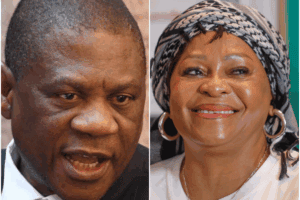ANC top brass said they would identify the age, location and demographic of voters it had lost, this time not ruling out culture or tribalism.

The ANC acknowledges the “disappointing” and “very, very unfortunate” 40.18% it scraped at the national and provincial elections in May.
Now it is looking at exactly how it lost a majority for the first time since democracy, and what it can do to win its voters back.
The party’s first deputy secretary-general Nomvula Mokonyane and head of elections Mdumiseni Ntuli said they were delving into the root causes of why voters left the party, especially those who turned to former president Jacob Zuma’s uMkhonto weSizwe (MK) party.
The pair were addressing media during a national executive committee (NEC) meeting outcomes session on Friday – day two of the six-day meeting of the party’s biggest leaders, in Boksburg.
‘Not a carcass in our lifetime’
An animated Mokonyane said the ANC would “not become a carcass in our lifetime” because it had “learned from its mistakes”.
The NEC was discussing how certain facets of campaigning and ANC operations would need to improve, namely: dialogue, accountability, educated recruitment of members and leaders and connecting with the challenges of the masses rather than being inward-looking.
They owed it to the six million people who voted for them, she said.
Ntuli said there is an assumption out there that “the ANC doesn’t learn”, but this is false.
“We all have understood that for the first time, the ANC has less than 50%. It is a totally new situation. It requires that we make certain changes in terms of how we conduct our business as a party,” he said.
He said for a period of time, there had been a steady decline of movement in the party and less connection with people on the ground.
WATCH: ‘ANC not responding to demands of DA’ – Mokonyane
Furthermore, he said the environment in the election buildup was “hostile to the ANC”, which was also a reason for its poor performance.
“We began [campaigning] at a time when load shedding was at its peak and the mood in the country towards the ANC and the ANC-led government was quite negative, very difficult to campaign on.”
However, he said interventions were done to “inform a national conversation” to help deal with this.
Yet water provision and the state of governance in some municipalities had impacted negatively on the ANC’s standing.
Identifying non-voters
Mokonyane said many people did not turn out to vote and it was a goal of the ANC to identify the general locations, ages and demographics of these people.
“We can’t conclude that they would have not voted for the ANC,” she said.
“We needed to ensure that our character of being a leader of society is that [which] we have earned. We need to make sure we go back and earn that status by working in communities not only for elections… for the whole five years prior to elections so that we become connected with the people with the challenges.”
ALSO READ: ‘ANC conference whispers will be suppressed to the moon and back’ – Mbalula [Video]
She said the low youth turnout was indicative of issues young people raised: unemployment, unreliable National Student Financial Aid Scheme (Nsfas) and social ills that affect young people.
Mokonyane said accountability had been listed in the ANC’s manifesto for the first time.
“We have also put that as one of the very important areas of focus for the ANC going forward, [more so] now under the government of national unity. We need to make sure everybody is held accountable.”
She said the ANC would build its strength and capacity through its appeal to voters, especially targeting the local government elections in 2026, treating them seriously.
Role of tribalism and culture?
She said after the NEC meeting, members would look at strengthening election machinery, especially in KwaZulu-Natal – where the party lost many voters to the MK party – and Gauteng.
Mokonyane said the ANC must honestly look at why they lost so many voters and if tribalism and culture may have played a part.
The deputy secretary-general said eleventh-hour interventions such as Panyaza Lesufi’s abandoned Nasi iSpani job programme were seen as suspicious by voters and future interventions would need to start now rather than later.
ALSO READ: Lesufi dumping jobs heartless
Watch the briefing below:
Support Local Journalism
Add The Citizen as a Preferred Source on Google and follow us on Google News to see more of our trusted reporting in Google News and Top Stories.








